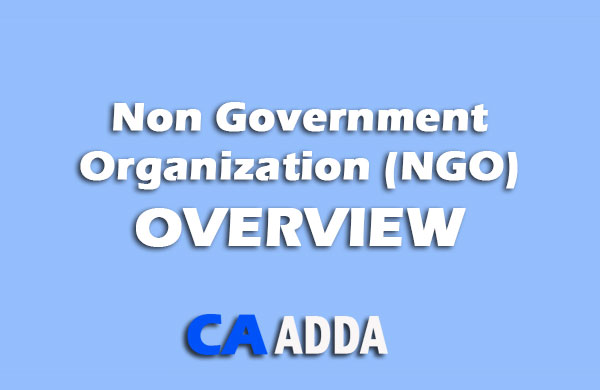Non Governmental Organisation : Overview
In India non profit organisations/ public charitable organisations (NGO) can be registered as Trust, Society and Private limited non profit company, under section-8 companies.

Definition of NGO – Non Governmental Organisation:
Non Governmental Organisation (NGO) or Non Profit Organisation (NPO) is a group, organisation, non profit establishment or non profit entrepreneurship of individuals, activists, voluntary and social persons. NGO or NPO is a social voluntary organisation of social activist, group of persons, community, persons, volunteers, civilians and citizens who are working or associated for social welfare and social development. If a group of person or community want to work for social change and on certain issues it can work as NGO without getting registration. NGO can be registered or can not be registered. NGO is recognised in its registered form and can get all kind of support including financial support when it is registered at Government registering authorities. NGO can be run, managed and operated by the members and other persons who are associated with it and work for social and ethical objects.
What is NGO : NGO as a association includes groups and institutions with primary humanitarian and co-operative objectives rather than commercial objectives completely or widely independent from Government. NGOs are private agencies to support development at local, national and international level by organised indigenous groups. NGO as a citizen Groups raises awareness and influence policies and includes independent cooperatives, community associations, societies, groups and various associations.
NGO works for the betterment and upliftment of socio-economically and politically weaker section of community to bring them in the main stream of society and move the society towards more improved and developed way of living and existence. As a community group and organisation NGO provides and fulfills certain services, development oriented tasks and works with aims and objectives to bring about required positive changes in society, community, areas and situations.
NGO helps and supports people for their legal rights and powers in society. NGO supports, maintain sand governs the status of Government organisations, ministries, departments, agencies, authorities for the aim, task, rules and purpose those are formed and running for; this is done in legal and democratic way and with people participation pattern to fulfill common interest. NGO is known and works for people’s participation in various required issues and tasks to support and improve the circumstances, conditions and situations.
NGO is managed by the resources, funds and other kind of desirable support of Government, funding agencies, support agencies, support communities, with support and help of business groups and people. NGO can get help to run in a variety of sources, including the fees of members, private donations, grants, sales of goods and services. NGO as a charitable and religious associations manages private funds for development, distribution of food, clothes, medicines, equipments, facilities and tools to needy persons and communities. NGO as nonprofit making organisation in nature does not work for trade or business purpose but profits by sales of goods and services may be used for the aims and objectives. NGO is non profit making organisation, works for no profit and no gain so it is also known and identified asNon Profit Organisation (NPO)
Mission, Vision, Objectives and Goals of the NGOs are to improve human life and civilization.
NGO Registration Method
In India non profit organisations/ public charitable organisations (NGO) can be registered as:
- Trusts
- Societies
- Private limited non profit company, under section-8 companies.
Trust Registration
- The request for NGO Registration must be made to the official having jurisdiction over the region in which the trust is required to be registered.
- Subsequently giving details (in the form) about designation by which the public trust will be known, names of trustees, mode of succession, etc., the applicant has to affix a court fee to the form & pay a registration fee which may range differently, depending on the location & value of the trust office & trust property.
- The application procedure must be signed by the applicant before the registrar, sub-registrar, deputy registrar, regional officer or superintendent of the regional office of the charity commissioner or authorized The application form would be submitted, together with a copy of the trust deed.
- Two other documents which should be submitted at the time of making an application for registration are affidavit & consent letter.
Society Registration
- In accordance with section 20 of the Society Registration Act, 1860, the subsequent societies can be registered under the Act charitable societies, military orphan funds or societies established in India and societies which are established for the promotion of art, science or literature for education, the circulation of useful knowledge, the diffusion of political education, the foundation or maintenance of libraries or analysis rooms for over-all use amongst the members or open to the public, or public museums & galleries of paintings & other works of art, collection of natural history, mechanical & philosophical inventions, instruments or designs.
- Societies are registered under the Societies Registration Act, 1860, which is a federal act. In certain states, which have a charity commissioner, the society must not only be registered under the Societies Registration Act but also, additionally, under the Bombay Public Trusts Act.
- The foremost instrument of any society is the memorandum of association (MOA)& rules & regulations (no stamp paper required), wherein the aims & objects & mode of management (of the society) must be enshrined.
- A Society needs a minimum of seven managing committee members; there is no upper limit to the number managing committee members & the Board of Management is in the type of a governing body or council or an executive committee.
- Registration can be done either at the state level (i.e., in the office of the Registrar of Societies) or at the district level (in the office of the District Magistrate & the local office of the Registrar of Societies)
- The procedure varies from state to state. However generally the application must be given together with memorandum of association & rules & regulations; consent letters of all the members of the managing committee; authority letter which shall be duly signed by all the members of the executive committee; an affidavit sworn by the president or secretary of the society on non-judicial stamp paper, together with a court fee stamp; & a declaration by the members of the managing committee that the funds of the society will be used only for the purpose of furthering the aims & objects of the society.
- All the aforementioned documents which are essential for the application for registration must be submitted in duplicate, together with the essential registration fee. The trust deed, the memorandum of association (MOA)& rules & regulations shall not be executed on stamp paper.
Section 8 Company Registration
- In accordance to Section-8 of Indian Companies Act, 2013 (Old section 25(1)(a) & (b) of the Indian Companies Act, 1956, a section-25) a section 8 company can be established for encouraging commerce, art, science, religion, charity or any other useful object, provided the profits, if any, or other income is applied for promoting the objects of the companies& no dividend is paid to its members.
- Section-8 companies are registered under section 8 of Indian Companies Act 2013 (old section-25 of the Indian Companies Act, 1956).
- For a section-8 company registration, the main instrument is a Memorandum& article of association (no stamp paper required)
- A section-8 Company requires a minimum of 3 members; there is no upper limit to the number of members. The Board of Management is in the form of a Board of directors or managing committee.
- An application has to be made for availability of name to the registrar of companies, which must be made in the prescribed form INC-1, together with a fee. It is suitable to recommend a choice of 3 other names by which the company shall be called, in case the first name which is projected is not found acceptable by the registrar.
- Once the availability of name is confirmed, an application should be made in writing to the regional director of the company law board. The application should be accompanied by the following documents; Three printed or typewritten copies of the memorandum & articles of association of the proposed company, duly signed by all the promoters with full name, address & occupation.
- A statement by an advocate or a chartered accountant that the MOA&AOA have been drawn up in conformity with the provisions of the Act & that all the essential things of the Act & the rules made thereunder have been duly complied with, in respect of registration or matters incidental or supplementary thereto.
- Three copies of a list of the names, addresses & occupations of the promoters (& where a firm is a promoter, of each partner in the firm), as well as of the members of the proposed board of directors, together with the names of companies, associations & other institutions in which such promoters, partners & members of the proposed board of directors who are the directors or who hold responsible positions with description of the positions so held.
- A declaration presenting in detail the assets (with the estimated values thereof) & the liabilities of the association, as on the date of the application or within seven days of that date
- An estimation of the forthcoming annual income & expenditure of the projected company, specifying the sources of the income & the objects of the expenditure.
- A statement giving a brief description of the work, if any, already done by the association & of the work proposed to be done by it after registration, in pursuance of section-8.
- A statement which specifies briefly the grounds on which the application is submitted.
- A declaration by each of the persons making the application that he/she is of sound mind, not an undercharged insolvent, not convicted by a court for any offense &is not disqualified under Companies Act 2013, for appointment as a director.
- The applicants must also furnish to the registrar of companies (of the state in which the registered office of the proposed company is to be, or is situated) a copy of the application & each of the other documents that had been filed before the regional director of the company law board.
- The applicants should also, within a week from the date of making the application to the regional director of the company law board, publish a notice in the prescribed method at least in a newspaper in the principal language of the district where the registered office of the projected company is to be situated or is situated &circulating in that region, & at least once in an English newspaper circulating in that region.
- The director may, after bearing in mind the objections, if any, received within 30 days from the date of publication of the notice in the newspapers, & after consulting any of the authority, department or ministry, as the one may in their discretion agree to determine whether the license must or must not be granted.
- The director might also provide direction to the company to enclose in its memorandum, or in its articles, or in both, such conditions of the license as may be specified by one in this behalf.


































